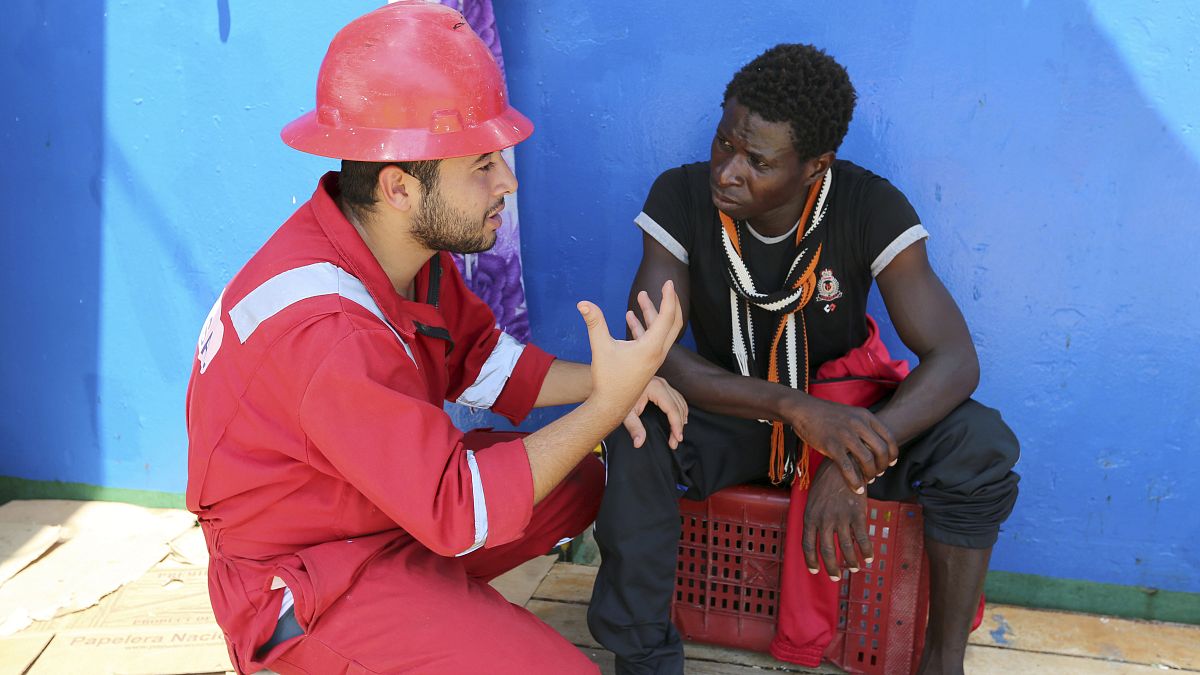Not strong enough: The unspoken mental health struggles of aid workers

Mental health has emerged as a critical issue among humanitarian workers, yet there’s a longstanding silence around the support they need, and they must often face crises or war zones without adequate care, Euronews has been told.
Humanitarian aid has become an essential part of today’s world, with the UN saying over 300 million people suffer from forced displacement or natural disasters.
But the risks of being an aid worker have never been higher. In 2023, a record 595 were killed, wounded, or kidnapped, marking one of the darkest years in the sector’s history.
“These risks challenge workers’ motivation and raise concerns about the respect for international humanitarian law,” said Belgian aid worker Olivier Vandecasteele, who pointed to the “erosion of respect” that humanitarian operators face today.
Vandecasteele, who was held hostage in Iran for 456 days, founded Protect Humanitarians—a global alliance committed to protecting frontline humanitarian personnel. His organisation also offers emergency financial support to aid workers in peril, in partnership with the Belgian King Baudouin Foundation.
Mental health in particular has become a key focus for Protect Humanitarians. “The idea is to create at least one safe space where organisations can share and learn from each other about mental health support,” Vandecasteele said, pointing out that too often, workers’ psychological well-being is overlooked.
Clinical psychologist and trauma therapist Cyril Cosar identifies several major mental health risks for aid workers, including burnout, PTSD, personal safety fears, and concerns for the loved ones they leave behind.
Culture of sacrifice
Steve Dennis, a former humanitarian worker, highlights the emotional toll of the job, as it takes a strong sense of solidarity and empathy to leave a safe place for a dangerous one.
That same empathy can be overwhelming when workers feel powerless and, combined with constant exposure to suffering, often leads to fatigue and secondary trauma.
Dennis, who now runs Proper Support Recovery Consulting, an organisation dedicated to helping aid workers recover from trauma, explained it’s difficult to compartmentalise emotions without becoming a robot.
Humanitarian workers, especially those who experienced traumatic environments like refugee camps or clinics for war victims, often struggle to acknowledge their own needs in comparison to those around them.
“I would say 100% of the people I’ve worked with have said their injury or problem is not ‘as bad as’ [those they’re helping],” Dennis said.
Cosar noted that the sector is steeped in a “culture of sacrifice,” where workers feel they must give their all, regardless of how they’re feeling.
Unlike the people they help, who are clearly identified as victims, humanitarian workers’ exhaustion and trauma are often invisible, making it difficult to assess how well they are coping.
“As a humanitarian worker, it’s like you’re not allowed to be a victim—you have to be strong all the time,” said Mila Leonova, Director of the Alliance of Ukrainian Civil Society Organizations.
Many civil society organisations were thrust into humanitarian work after Russia’s full-scale invasion of Ukraine, with no adequate preparation. “Nearly three years in, we’re completely burned out. But in our culture, admitting to this weakness feels shameful,” Leonova added.
Prevention and funding
For some, sharing best practices in mental health support is crucial, but often neglected.
“People buy lottery tickets because they think they’ll win, but they don’t prepare for injuries because they don’t expect them. Then they’re deployed to high-risk areas where injuries are likely,” Dennis said.
While professions like doctors, police, and military personnel receive extensive training and support to deal with traumatic situations, aid workers often receive far less.
“We consider a four-day hostile environment awareness training before deploying to Somalia as the gold standard. But other high-risk professions receive months or even years of preparation,” Dennis explained.
Insurance is another challenge. Many policies don’t cover war zones or mental health issues, and claims for mental health injuries are often denied if they are not diagnosed immediately.
Vandecasteele advocates for earmarking a portion of donations specifically for the mental health care of humanitarian workers.
“Brussels is an ideal place to discuss this, with the European Commission nearby, and opportunities to engage with various donors,” said Leonova.
The EU is one of the world’s largest providers of humanitarian aid, offering over €2.4 billion in 2023. For Dennis, investing in workers’ well-being is crucial: “It’s like maintaining a vehicle. A well-cared-for car lasts longer and performs better. The same goes for your staff.”
World News || Latest News || U.S. News
Source link



